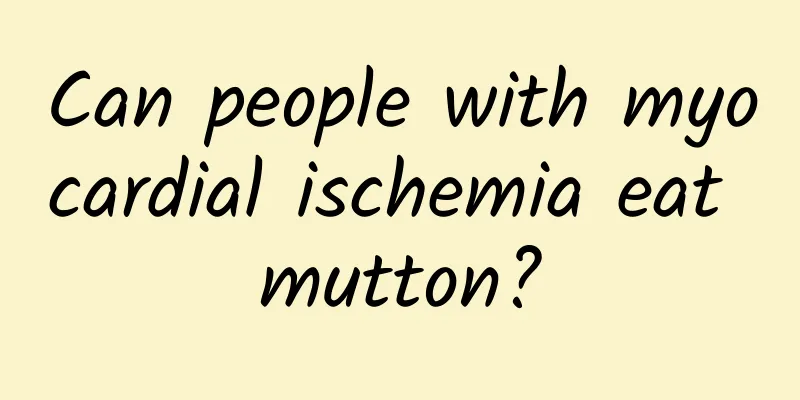Can people with myocardial ischemia eat mutton?

|
People with myocardial ischemia have many dietary requirements, because a poor diet is not conducive to the treatment and recovery of the disease. Common foods such as beef and mutton fat are not suitable for people with myocardial ischemia. Instead, they should pay attention to supplementing vitamins, minerals and other nutrients. 1. Eat less or avoid food Too much food, especially high-fat food, is particularly difficult to digest and can greatly increase the burden on the heart, causing abdominal bloating and raising the position of the diaphragm, thereby restricting the normal contraction and relaxation of the heart. In addition, due to the need to digest food, more blood in the body is concentrated in the gastrointestinal tract, making the blood supply to the occlusive artery even more insufficient, thereby aggravating myocardial ischemia and hypoxia. It may even induce angina pectoris, myocardial infarction and endanger life. If you eat too much at dinner, the harm will be even greater. Because the blood flow rate is slower after falling asleep and overeating will greatly increase the blood lipids in the blood, causing them to deposit on the blood vessel walls, thereby affecting the elasticity of blood vessels and causing arteriosclerosis. Therefore, patients with coronary heart disease should avoid overeating. Foods that patients with myocardial ischemia need to choose carefully: 1. Sugar, alcohol, cigarettes, chocolate, etc. 2. Fatty meat, including pork, beef, lamb and other fat. 3. Animal fats, such as lard, butter, mutton fat, chicken fat, etc. 4. Brain, bone marrow, internal organs, egg yolk, and caviar. 5. Molluscs and shellfish. 2. Foods that can be eaten at will 1. Vegetables, such as onions, garlic, cauliflower, mung bean sprouts, lentils, etc. 2. Various melons, fruits and tea. 3. Various cereals, especially coarse grains. 4. Bean products. 5. Fungi and algae, such as shiitake mushrooms, black fungus, kelp, seaweed, etc. 3. Eat the right food 1. Fish, including most river fish and sea fish. 2. Milk, including skimmed milk and its products. 3. Vegetable oils, including soybean oil, corn oil, sesame oil, peanut oil, fish oil, and olive oil. 4. Eggs, including egg whites and whole eggs (2 to 3 eggs per week). 5. Lean meat, including lean pork, beef and poultry (skinless). |
<<: How to treat myocardial ischemia caused by hypertension
>>: What should not be eaten when tonsillitis occurs? There are many dietary taboos.
Recommend
What fruits should I eat for asthma? These fruits can cure asthma
Asthma is very common. Sufferers of asthma may ha...
What are the symptoms of excessive anger?
Excessive irritability is quite common in daily l...
What are the treatments for kidney deficiency caused by masturbation?
Many people have watched pornographic films and m...
What is the cause of dandruff?
Dandruff, this word is very familiar to everyone....
You only know that Hong Kong is developed, but do you know that people in Hong Kong live long?
When it comes to longevity, people generally thin...
Asthma in 3 months of pregnancy is a boy
For many pregnant women, they will feel uncomfort...
How to treat acute laryngitis
Acute laryngitis is a common disease. The pain si...
I drank something cold after 10 days of medical abortion
Anyone with common sense knows that after a misca...
What are the remedies for dry eyes?
It is said that eyes are windows to the soul. Eve...
The tongue will give the first sign of illness
The tongue is an important organ inside the oral c...
Can pneumothorax and bullous lungs heal on their own?
In daily life, many tall and thin men are prone t...
What to do if my face is allergic to acne
When we have allergic symptoms, we usually get ac...
Pain when pressing the inner knee bone
The knee is a very important part of the human bo...
How to eat Cistanche deserticola? Are you eating it right to nourish the kidneys?
Cistanche deserticola is a traditional Chinese me...
Can pregnant women apply foot ulcer medicine?
Everyone knows that you cannot take medicine casu...









